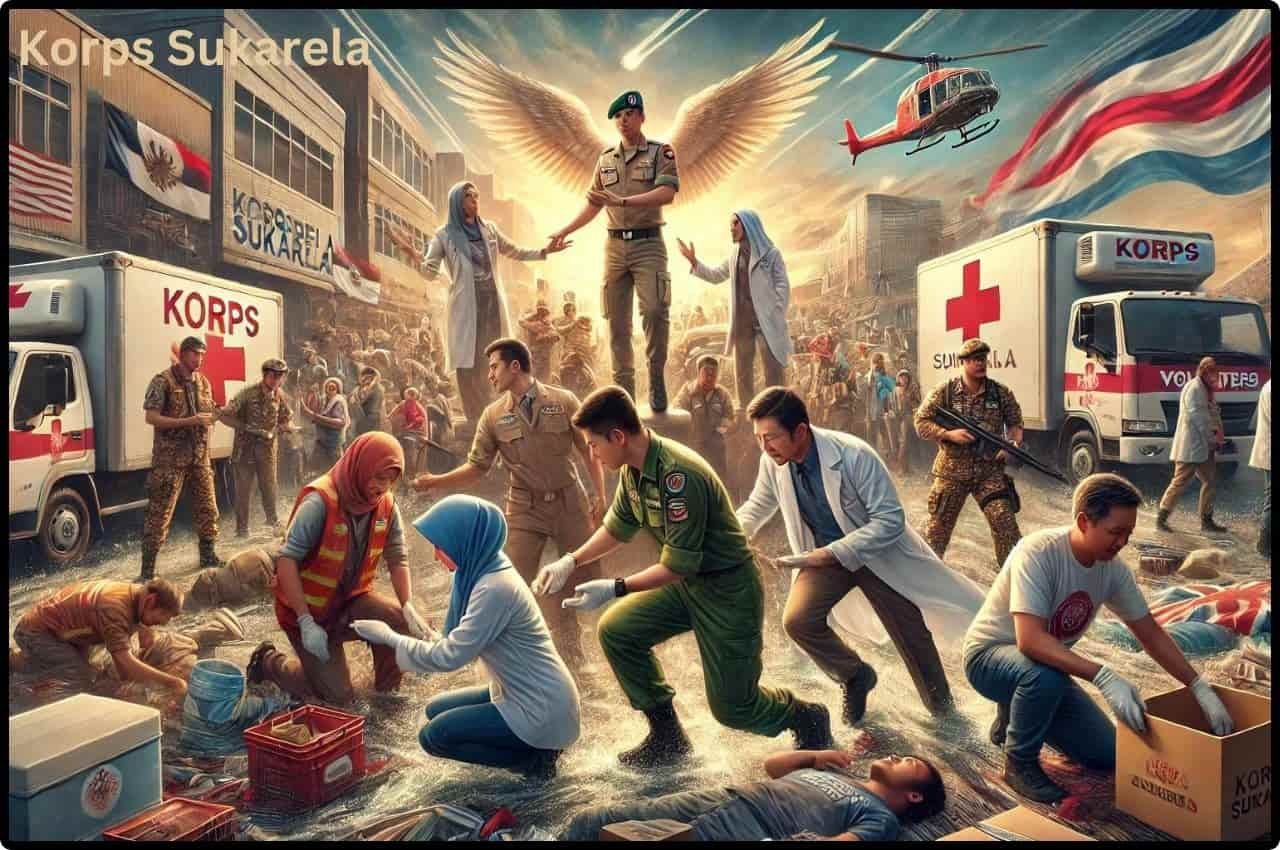Korps Sukarela: A Closer Look at Voluntary Corps in Indonesia
In Indonesia, the term Korps Sukarela refers to the voluntary corps that plays a significant role in community service, disaster relief, and various social initiatives nationwide. These voluntary groups, also known as Korps Relawan or Korps Kemanusiaan, consist of individuals from different walks of life who contribute to society through their time, energy, and expertise. This article delves into the origins, roles, and significance of Korps Sukarela in Indonesia, highlighting the spirit of volunteerism that drives these organizations and their impact on society.
The Origins of Korps Sukarela
Volunteerism in Indonesia has deep cultural and historical roots, closely tied to the spirit of gotong royong, a traditional Indonesian practice of communal cooperation and mutual assistance. Going royong encourages community members to work together to achieve common goals, whether building infrastructure, organizing local events, or providing aid during emergencies.
Korps Sukarela, as an organized volunteer corps, began to formalize in the 20th century, mainly after Indonesia gained independence in 1945. During the early years of nation-building, volunteerism became a crucial component in addressing the new nation’s social and economic challenges.
Establishing formal volunteer organizations, such as the Palang Merah Indonesia (PMI), the Indonesian Red Cross, and other humanitarian groups, marked the institutionalization of volunteer efforts in the country.
These voluntary corps were instrumental in responding to natural disasters, providing healthcare in rural areas, and assisting in community development projects. Over the years, Korps Sukarela has evolved, adapting to new societal needs and incorporating modern methods of organizing and mobilizing volunteers.
The Role of Korps Sukarela in Society
Korps Sukarela plays a multifaceted role in Indonesian society. Their functions span several areas: disaster relief, health services, social work, education, and environmental conservation. Here’s a closer look at some of the critical roles they perform:
1. Disaster Relief and Emergency Response
Indonesia is geographically located in the Pacific Ring of Fire, making it highly prone to natural disasters such as earthquakes, volcanic eruptions, tsunamis, and floods. Korps Sukarela has historically played a crucial role in disaster relief operations. Organizations like PMI and Badan Nasional Penanggulangan Bencana (BNPB, the National Disaster Management Authority) work closely with voluntary corps to coordinate and deliver aid to disaster-stricken areas.
Volunteers are often the first responders, helping to evacuate victims, distribute relief materials, set up temporary shelters, and provide medical care. Their quick mobilization and local knowledge are invaluable in mitigating the effects of disasters and ensuring that aid reaches those in need.
For example, during the devastating 2004 Indian Ocean tsunami, which severely impacted Aceh, Korps Sukarela was at the forefront of rescue and relief efforts. Volunteers from across the country and international relief workers collaborated to provide survivors with food, medical supplies, and other essentials while participating in long-term rebuilding efforts.
2. Healthcare and Medical Assistance
Healthcare volunteerism is another critical area to which Korps Sukarela contributes. Many rural and remote areas in Indonesia still face challenges in accessing healthcare services, and volunteers often fill this gap. Mobile health clinics, vaccination drives, and health education programs are some of the initiatives that volunteers help organize.
In addition to direct healthcare services, Korps Sukarela often engages in blood donation campaigns, mainly through PMI’s nationwide blood donation program. These efforts help ensure a steady blood supply for medical emergencies and surgeries nationwide.
Moreover, during health crises like the COVID-19 pandemic, volunteers played a crucial role in supporting the healthcare system. They assisted in disseminating health information, helping with vaccination campaigns, distributing masks and sanitizers, and providing logistical support to overwhelmed healthcare facilities.
3. Environmental Conservation and Sustainability
Indonesia’s rich biodiversity and natural resources have always been a source of pride and sustenance for its people. However, rapid deforestation, pollution, and climate change have put the environment at risk. In response, many Korps Sukarela have focused on environmental conservation and sustainability initiatives.
Volunteer groups organize tree-planting campaigns, beach clean-ups, and awareness programs to educate the public about the importance of protecting the environment. They also advocate for sustainable practices such as reducing plastic use, conserving water, and promoting renewable energy.
For instance, environmental volunteers were instrumental in organizing community-based programs to prevent and mitigate forest fires in Kalimantan and Sumatra, regions often plagued by haze caused by illegal burning practices. By working closely with local communities, volunteers have helped implement fire-prevention strategies and raised awareness about deforestation’s environmental and health impacts.
4. Education and Youth Empowerment
Education is another sector where Korps Sukarela makes a significant impact. Volunteers often run literacy programs, provide tutoring for underprivileged students, and organize educational workshops in underserved areas. Many youth-based volunteer organizations focus on empowering young people with skills that can improve their prospects, such as language training, IT skills, and leadership development.
Youth engagement in volunteerism is critical, as it fosters a sense of civic responsibility and leadership among the younger generation. In recent years, youth-led initiatives like Gerakan Kemanusiaan Remaja (Youth Humanitarian Movement) have gained popularity, encouraging high school and university students to get involved in community service projects.
5. Social Work and Community Development
Beyond disaster relief and education, Korps Sukarela is deeply involved in social work and community development. Volunteers often work with marginalized groups, including older people, people with disabilities, and low-income families, providing them with support in the form of food, shelter, and vocational training.
One example is the work done by Rumah Zakat, an Indonesian nonprofit organization that mobilizes volunteers to address poverty through community empowerment programs. These programs include providing microfinance opportunities for small business owners, building infrastructure like clean water systems, and offering free healthcare services.
The Spirit of Volunteerism in Indonesia
The widespread presence and influence of Korps Sukarela in Indonesia are a testament to the country’s enduring spirit of volunteerism. Volunteerism is not merely seen as a duty but as a way of life, deeply rooted in the collective culture of gotong royong.
In recent years, technological advancements and the rise of social media have also changed the landscape of volunteerism in Indonesia. Online platforms like Kitabisa and Sociopreneur allow individuals to donate and volunteer for various causes more efficiently. At the same time, apps like AtmaGo enable community members to report issues, organize events, and request help during disasters.
The government has also encouraged volunteerism with various national campaigns and policies to foster a culture of civic engagement. For instance, the Ministry of Social Affairs regularly partners with volunteer organizations to implement community development and disaster relief programs.
The Challenges Faced by Korps Sukarela
While Korps Sukarela continues to play a vital role in Indonesian society, they also face several challenges. One of the primary challenges is funding. Many voluntary organizations rely on donations and government grants to operate, and limited resources can restrict the scale and impact of their activities. In addition, volunteers often face physical and emotional strain, mainly when dealing with large-scale disasters or health crises.
Another challenge is better coordination between different volunteer groups and government agencies. While there is a strong tradition of volunteerism in Indonesia, there can sometimes be a lack of centralized coordination, leading to inefficiencies in resource allocation and response times during emergencies.
Conclusion
Korps Sukarela represents the heart and soul of volunteerism in Indonesia. Through their tireless efforts in disaster relief, healthcare, environmental conservation, education, and social work, these volunteers embody the spirit of going royong—working together for the greater good of society. As Indonesia continues to face new challenges, from natural disasters to public health crises, the role of Korps Sukarela will remain crucial in building a resilient and compassionate nation.
By fostering a culture of volunteerism and ensuring that volunteers are equipped with the resources and support they need, Indonesia can continue to benefit from the incredible contributions of its Korps Sukarela, making a lasting positive impact on communities across the archipelago.






